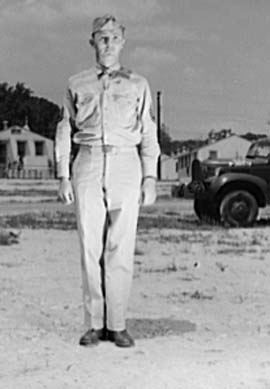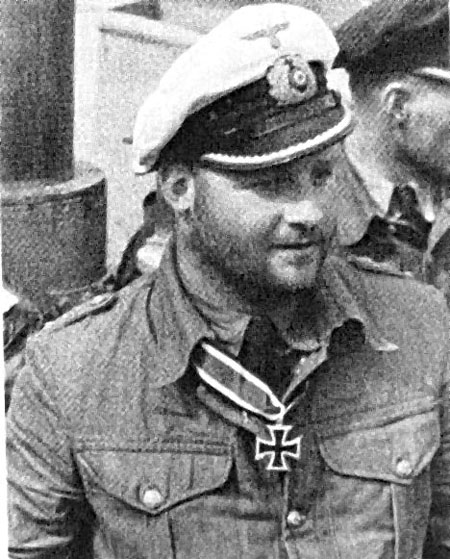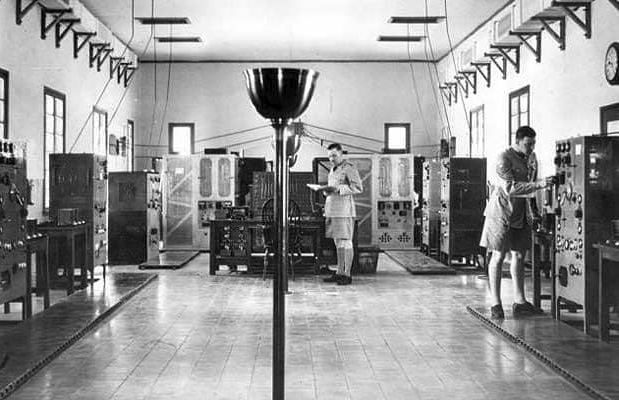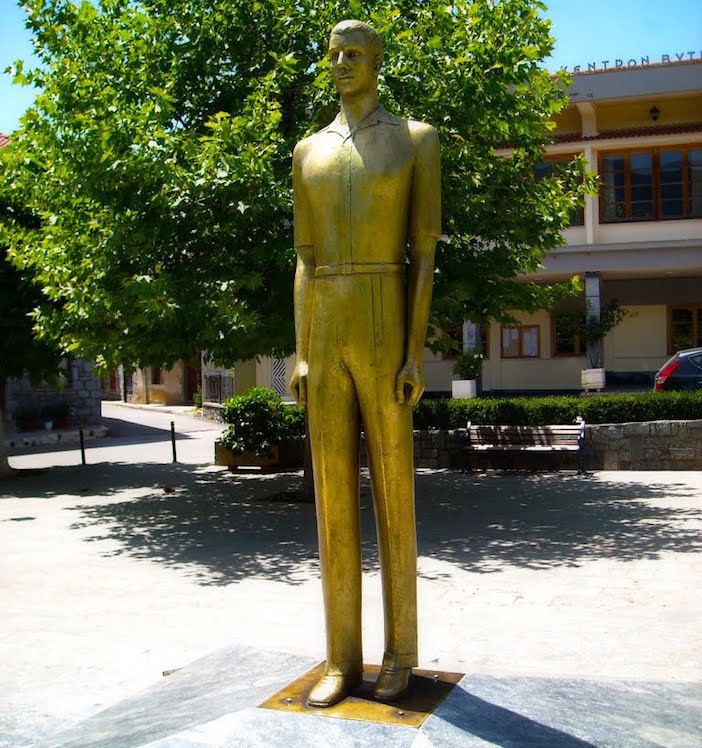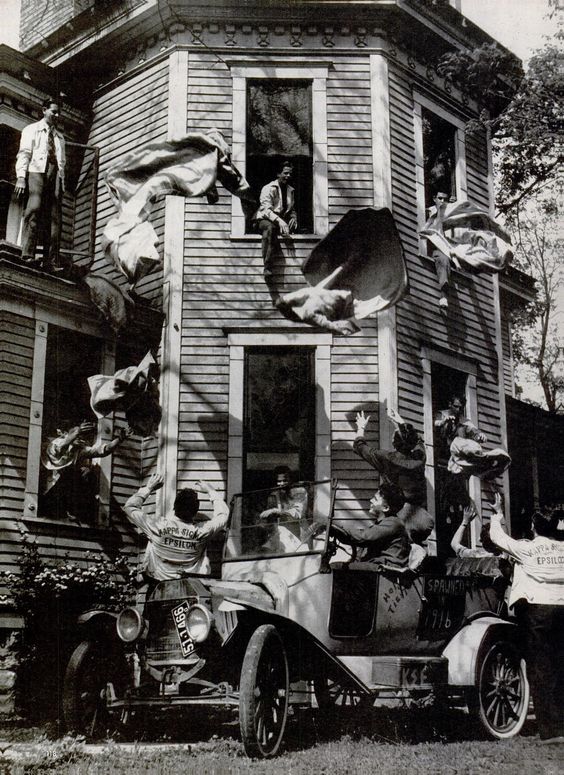Thursday 29 May 1941
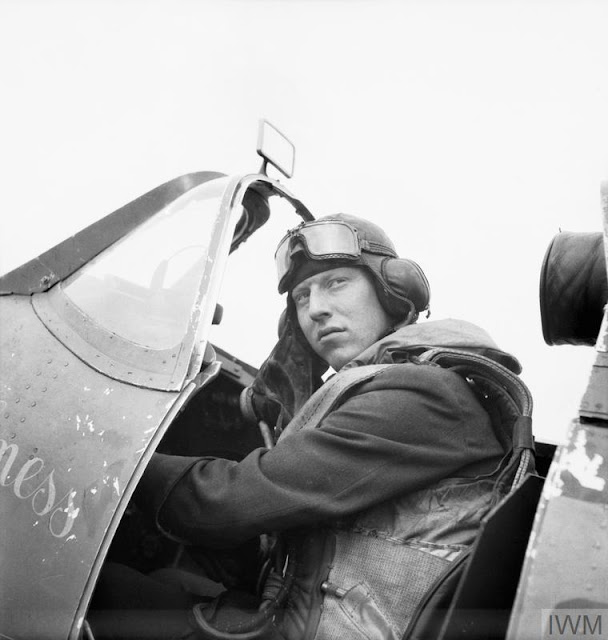 |
| "Flight Lieutenant J H "Ginger" Lacey of No. 501 Squadron RAF, in the cockpit of his Supermarine Spitfire Mk I at Colerne, Wiltshire, 29 May 1941." At this time, he has 23 victories gained in 1940 (Imperial War Museum CH2793). |
Rashid Ali, the Grand Mufti, and Ali's cabinet flee to Persia. The British under Major-General Clark are still five miles from Baghdad, but rioting and panic have begun there as Iraqi control collapses. The disparity of forces between the two sides is immense - some 20,000 Iraqi troops face about 1450 British troops - but the British are used to facing such odds against native forces and prevailing against them.
The British air-lift the 2/4th Gurkha Battalion of Indian 20th Brigade from Basra to Habbaniya, which now is well behind the lines.
The real action now is in Syria, which is in British sights because it has been providing the Luftwaffe with transit hubs for flights to Iraq at Palmyra and Aleppo. Germans on 29 May 1941 send forces from the Italian Dodecanese Islands to the port of Latakia in northern Syria. These troops, in armored cars, head down to Beirut.
 |
| Wrecked Junkers Ju 52 transport planes on the beach at Maleme airfield, Crete, May/June 1941 (Federal Archive Bild 101I-166-0512-39). |
East African Campaign: According to the evening War Cabinet minutes, Churchill feels that French Somaliland is ripe for invasion. He suggests that "the Foreign Office should be prepared to take action in French Somaliland at the psychological moment of our entry into Syria."
 |
| Daily Sketch, Number 1941, 29 May 1941. |
U-557 (KrvKpt. Ottokar Arnold Paulssen), on its first patrol out of Kiel, is part of patrol line West, formed in support of the Bismarck operation. At 20:43, Paulssen puts a torpedo into 7290-ton British freighter Empire Storm south of Cape Farewell. The Empire Storm goes down, and three crew are killed. The 40 survivors are picked up by freighter Marita and taken to St. John's.
West of Gibraltar (northwest of Rabat), an inconclusive action develops between Royal Navy destroyers and Italian submarine Venero. Destroyer HMS Forester reports attacking the Venero on the surface, and Venero reports torpedoing a destroyer. Neither side suffers any damage.
Putting a final period on the failure of Operation Rheinübung, German cruiser Prinz Eugen - the always overlooked part of the operation - develops engine trouble and heads for France. Her destination is Brest, and she will make it there unhindered on 1 June. She has not sunk a single ship. In a cable today to President Roosevelt, Winston Churchill notes how "most important" it is to find the Prinz Eugen quickly. He also notes in passing that the Bismarck was "a terrific ship and a masterpiece of naval construction."
The Royal Navy decides to make a sweep of the Atlantic for supply ships sent out by the Kriegsmarine to support battleship Bismarck (now sunk) and the Prinz Eugen. A powerful force led by the aircraft carrier HMS Eagle departs from Freetown to seek out such German ships in the South Atlantic.
U.S. Navy Patrol Squadron Fifty Two (VP-52), based at Naval Air Station (NAS) Argentia, Newfoundland with PBY-5 Catalinas, expands its reach. It sends planes to survey the remote east coast of Greenland, suspected of being used by the Germans at abandoned Danish weather stations. Royal Navy auxiliary oiler Teakwood arrives at St. John's to support the Newfoundland Escort Force (NEF), which has a lot of ships but virtually no support services. The NEF already is up and running, however, escorting its first convoy bound for Liverpool.
The US Navy sends Task Group Three (TG3), led by the aircraft carrier USS Ranger and heavy cruiser Tuscaloosa, departs from Bermuda for a neutrality patrol in the Atlantic. They will cover over 4000 miles (6400 km). The US today extends its boundaries for Neutrality Patrols to include both the North and South Atlantic.
Royal Navy ocean boarding vessel Malvernian captures 407-ton German weather ship August Wriedt in the mid-Atlantic northwest of the Azores. The Malvernian puts a prize crew aboard and sends it to St. John's. The August Wriedt will be renamed Maria and used by the Royal Navy.
Convoy OB 328 departs from Liverpool.
Dutch destroyer HNLMS Isaac Sweers (Commander Jacques Houtsmuller) is commissioned.
Royal Navy destroyers HMS Grove and Southwold and minesweeper Whitehaven are launched.
Canadian minesweeper HMCS Swift Current is launched in Montreal.
US destroyer USS Swanson (Lt. Commander Marvin P. Kingsley) is commissioned, and destroyers Carmick, MacKenzie and McLanahan are laid down.
U-132 (Oberleutnant zur See Ernst Vogelsang), U-452 (Kapitänleutnant Jürgen March) and U-572 (Kapitänleutnant Heinz Hirsacker) are commissioned, U-262 and U-618 are laid down.
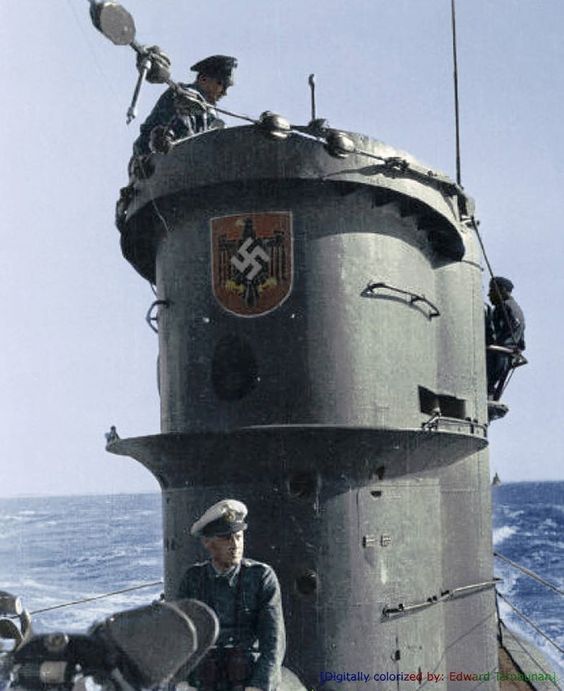 |
| U-132, a Type VIIC U-boat laid down on 10 August 1940 by Vegesacker Werft, Bremen-Vegesack as 'werk' 11, launched on 10 April 1941 and commissioned on 29 May 1941. |
Force D evacuates 6029 men from Sfakia, including the Greek Commander in Chief. Light cruiser HMS Phoebe takes some minor damage from a bomb, but otherwise, the large force escapes unscathed.
The Germans, of course, notice what is going on. The Luftwaffe shifts its focus from the north coast ports that the Germans need for supplies to the south shore ports such as Sfagia where the Royal Navy is frantically loading as man men as possible. It becomes a situation of "every man for himself" both on Crete and in the waters to the south.
Junkers Ju 87 Stukas catch two light cruisers, HMS Orion and Dido, on their way back to Alexandria during the afternoon and damage them. While the ships remain maneuverable, Orion suffers 105 crew and 260 troops killed, with 280 troops wounded. Dido has 27 crew and 100 troops killed by fire or water pumped in to prevent the magazine from exploding. Destroyer Decoy also is damaged during this action. The flotilla makes it to Alexandria around 20:00.
 |
| HMS Dido is bombed on 29 May 1941 (Australian War Memorial). |
Also during the early morning hours, Italian bombers from 41° Gruppo damage I-class destroyer HMS Imperial. While the ship makes it partway to Alexandria, the steering goes out. The crew tries to make repairs, but ultimately they are forced to scuttle the Imperial (with the assistance of HMS Hotspur) 55 nautical miles (102 km; 63 mi) east of Kassos.
 |
| The Walt Disney Studios strike officially begins on 29 May 1941. Cartoonish picket lines always have the best signs! |
In Cairo, Middle East Commander General Archibald Wavell is planning another offensive on the Libyan frontier. British intelligence reports tell him that the Germans have placed about two-thirds of their tank force on the Tobruk perimeter, leaving the frontier sparsely defended. Assuming that the "Tiger Cub" tanks will arrive from Alexandria quickly, Wavell sets 7 June as the start date for Operation Battleaxe.
Churchill is increasingly annoyed about General Wavell. Private Secretary John Colville notes in his diary:
PM [Churchill] much upset by telegram from Wavell, who shows some sign of defeatism. "He sounds a tired and disheartened man," said the PM.Churchill long has felt that Wavell lacks an aggressive spirit and does not use his troops efficiently. Wavell's quick plea to give up Crete after Churchill had sent a message only hours earlier on the 27th clearly still rankles. It is worth mentioning here that Wavell has kept the British position intact in the Middle East and has consolidated it by largely eliminating the longstanding Italian presence from East Africa with minimal troop investment.
Winston Churchill sends General Ismay a memo telling him to hold off for now on seizing the Vichy French ships being detained at Alexandria. "We must wait at present to see how things go in Syria."
At Tobruk, the Luftwaffe (Junkers Ju 87 aircraft of II Staffeln, Sturzkampfgeschwader 2) sinks 913-ton anti-submarine trawler HMT Sindonis. In Malta, the government sets up a mobile machine-gun company to guard against Fallschirmjäger dropping on the island as they did on Crete. The company is formed from 1st Battalion Cheshire Regiment.
However, it might be better to use these docile Italian prisoners of war instead of bringing in disaffected Irish, over whom we have nothing like the same control.Churchill proposes bringing "say, 25,000 of these Italians" and using them as farmers. Churchill's proposal is at the very least arguably contrary to accepted rules of war, as prisoners of war are not supposed to be used as slave labor in war industries.
At Colditz Castle, the Oflag IV-C "Officer's Camp," a dozen British and Polish prisoners attempt a breakout. They crawl through a sewer pipe from the canteen to an outer courtyard, where they have to descend a 40-foot wall. To pull of the escape, they have bribed a seemingly sympathetic guard. However, the guard double-crosses them and reports the escape plan, and other guards are waiting. The prisoners, including later author Pat Reid, are sent to solitary confinement (the "Cooler").
Referring to the comment on the disappointing reception accorded in the British Press to President Roosevelt's speech, the Prime Minister directed that the Ministry of Information should arrange for a more enthusiastic line to be taken.Of course, it goes without saying that the entire German press is controlled and a mouthpiece for the German government to a much, much greater extent than any other government uses its media (outside of Moscow). However, this is evidence that the British press also is not completely independent during the war. Great pains are made throughout the conflict to shape public opinion through manipulation of the British press.
Anglo/US Relations: British Prime Minister Winston Churchill sends a cable to President Roosevelt in which Churchill praises Roosevelt for his recent fireside chat declaring an unlimited state of emergency. He hints at upcoming events:
[US Ambassador John Gilbert] Winant will tell you what I managed to send out there secretly, and the hopes I have of some good news coming to hand before long.Churchill apparently is referring to the 200+ tanks sent to Alexandria in the Tiger convoy, and the "good news" the upcoming operation planned on the Libyan border, Operation Battleaxe.
British Government: Foreign Secretary Anthony Eden gives a talk at The Mansion House. He argues that the German "vast and sinister fabric" of "tyranny" cannot last because the "despotism is utterly ruthless" and "no system that is built upon hate can survive." In a remark that is part prescient and part massive understatement, he states:
In speaking of the reconstruction of Europe I do not overlook the fact that its settlement may affect and may be affected by developments elsewhere, such as, for example, in the Far East.He disavows any British interest in "economic exploitation either of Germany or of the rest of Europe" after the war.
King George VI, wearing the uniform of an Admiral of the Fleet, visits HMS King Alfred, a training establishment at Hove.
Croatia: The Duke of Spoleto (newly crowned King Tomislav II of Croatia) pays Italian Foreign Minister Count Ciano a visit. According to Ciano's diary, "the tone of his conversation was distinctly anti-German."
British Homefront: The London Daily Mail writes a scathing editorial bemoaning the state of the war:
When are we really going to get down to the job of winning the war? When are we going to run machines, factories, and shipyards to full capacity; when are we going to see an end of masterly retreats ...?Most of the British media, however, is focused on the victory of battleship Bismarck to the exclusion of continuing problems elsewhere. This is a low point in the war for the British despite flashy victories in the Atlantic.
 |
| Strikers holding very artistic and witty signs outside of the Walt Disney Studios building in Burbank, California on or about 29 May 1941. |
Future History: Robert David Simon is born in The Bronx, New York. As Bob Simon, he becomes a well-known correspondent for CBS News and a fixture on news programs "60 Minutes" and "60 Minutes II." He becomes as 60 Minutes' senior foreign correspondent. He perishes on 11 February 2015 in an auto accident in New York City.
Robert F. Logan, Jr. is born in Brooklyn, New York. While attending the University of Arizona at Tucson, Logan is spotted by a Warner Bros. talent agent. He goes on to a long television and film career, including starring in "77 Sunset Strip" from 1958-1963 and "Daniel Boone" in 1965-66.
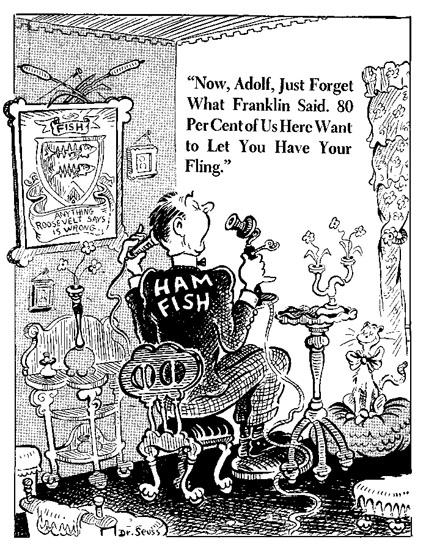 |
| A Dr. Seuss cartoon from 29 May 1941. Hamilton Fish is a well-known isolationist congressman from New York (image from "Dr. Seuss Went to War" by Richard H. Minear). |
May 1941
May 1, 1941: British Hold Tobruk
May 2, 1941: Anglo-Iraq War
May 3, 1941: Liverpool Hammered
May 4, 1941: Hitler Victory Speech
May 5, 1941: Patriots Day
May 6, 1941: Stalin In Command
May 7, 1941: May Blitz
May 8, 1941: Pinguin Sunk
May 9, 1941: U-110 Captured
May 10, 1941: Hess Flies Into History
May 11, 1941: The Hess Peace Plan
May 12, 1941: Tiger Arrives Safely
May 13, 1941: Keitel's Illegal Order
May 14, 1941: Holocaust in Paris
May 15, 1941: Operation Brevity
May 16, 1941: Blitz Ends
May 17, 1941: Habbaniya Relieved
May 18, 1941: Croatia Partitioned
May 19, 1941: Bismarck at Sea
May 20, 1941: Invasion of Crete
May 21, 1941: Robin Moore Sinking
May 22, 1941: Royal Navy Destruction Off Crete
May 23, 1941: Crete Must Be Won
May 24, 1941: Bismarck Sinks Hood
May 25, 1941: Lütjens' Brilliant Maneuver
May 26, 1941: Bismarck Stopped
May 27, 1941: Bismarck Sunk
May 28, 1941: Crete Lost
May 29, 1941: Royal Navy Mauled Off Crete
May 30, 1941: Sorge Warns, Stalin Ignores
May 31, 1941: British Take Baghdad
2020


